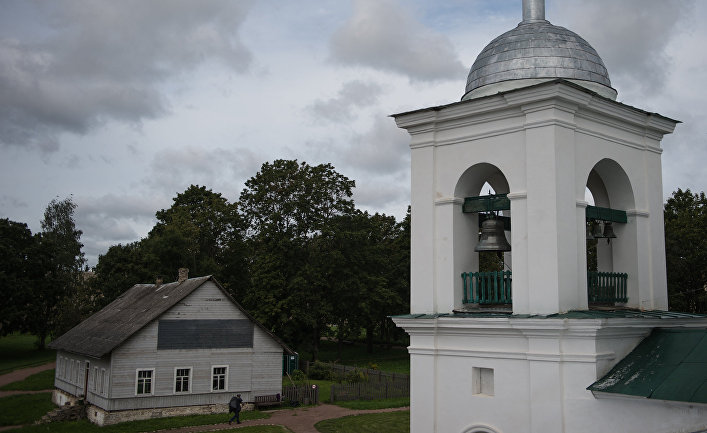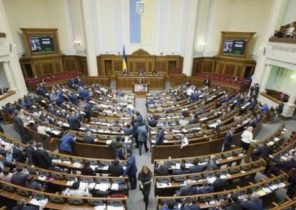
House Liivi anzini of intercession stands in the centre of Izborsk, in three steps from its local Museum. Inside dry heat from the Russian stove and the smell of pies, the homemade woven window curtains — a fantastic atmosphere, for which tourists in the ancient Russian settlements. Already retired after a scientific career in St. Petersburg, Liivi intercession returned to the land of their ancestors, whom fate has scattered all around the world.
Family history, Liivi of Ancini you can study the history of Russia in the XX century. Divided by ideology, war, Soviet censorship and the iron curtain, several generations still managed to stay a family.
The day of liberation from parents
Lieve, was born in Izborsk in September 1941. He keeps her birth certificate in Estonian signed by the father, a volost elder. The ants Tarma came to Izborsk on behalf of the Estonian government. Izborsk in those years were part of Estonia, it retains private property, the merchants and other bourgeois system. A short period of Sovietization of the Baltic States before the second world war here have not noticed.
Mother, Lieve that year just turned eighteen. Beautiful Russian girl Lelia Petunova married at the age of 17. Grandmother, Ekaterina Ivanovna, a simple Russian peasant, worked all her life from dawn to dusk. Grandfather, Alexander, passed through the First world war and had been in German captivity; when he wasn’t drinking — he worked as a bricklayer in Tartu and Tallinn is still a bridge, made by his hands.
And when the mother began to care for young beautiful Estonian grandmother, of course, saw a different life for my daughter. And so no doubt, to marry or not to give, was not: go daughter, at least you’ll live like human beings, says Mr. Lievi Antenna.
They were, mom and dad, Liva for a long time knew only from photographs. She lost her parents in August 1944, the retreating Nazis took them off.
— Since the day of the liberation of Izborsk, which is celebrated annually, is for me a “holiday” release from their parents, she says. — Not very happy, Yes. Mom, the Germans just were loaded in the car and drove. She worked as a telephone operator, and the Germans believed that she knew some secrets that tomorrow will give Russian. Father could not stay because he was a member of the Estonian administration. He gave me to the nanny and said, bring her grandmother, we’re going to Pechory, we then Levochko pick.
Neither his father nor mother with Devochkoy never returned. Their apartment became the property of the Soviet government together with all that was in it. “The grandmother said: do not give your dresses,” says Liive Antenna.
— Why parents did not take you with me?
I don’t even know why. They did not ask. Was the order: urgently to leave. Children are too burdened. Grandma loved a daughter… I felt all my life that the most important thing was her. So: “Why do you have a child who you will connect, because there is a war?” Go wherever you want, as long as you survived, you were alive.
Liwa remained with the grandmother and grandfather, who was not too happy with the extra mouth: “the Grandmother suffered and brought up in severity. All the time had the refrain: we raised you, you owe us. Like I’m to blame. And I am a very long time and thought I was to blame. Quite adult, after 40 years, I thought, and yeah — when I was a kid?”
Life in the hen house
From the Windows of my grandmother’s house on the Moscow street is visible, the Izborsk fortress. On five acres of land has three houses. Adult children have traditionally been built close to the parents, “Grandma said that we live in the hen house”.
The acres of land where the family sowed flax, planted rye and potatoes, after the war they chose, and in return gave “bodorik” close to home, 36 acres for the garden. It is here that today is the home of Liivi of Anzini.
Post-war life was very difficult, she recalls:
The family history of my grandmother’s pretty typical. Grandpa drank, drank heavily. Two weeks is drinking and says: “Katenok, let’s share” (my grandmother’s name was Kate). Crumbled grain, potatoes, all in half (and I am), and they shared. For two weeks he drank up and spoke the following words: “Katenok, let’s put up”. And getting, nowhere to go.
In 1947-48 on the territory of Izborsk parish first began to be a collective farm. Voluntarily to go to that nobody wanted, says Liive Antenna because I would have to give up his cow, horse, land, buildings.
— Grandmother was a deeply religious man. And she said the farm did not go, because there is the Antichrist, but rather will hang. And hang it tomorrow or the day after because already prepared the coffin, says, Liivi Antenna. She recalls that in the old peasant tradition in the house really kept the casket. She was 7 years old, a grandmother with a drinking grandfather, was afraid: “When I saw it, I said, grandma, please, a small coffin and I’ll die too. Then she came to her senses. She said, well, we will live.”
Petunova eventually joined the Izborsky farm was among the first 28 volunteers, while hundreds of villagers have continued to farm sole. The cause of Liivi Antenna finds out many years later. The Soviet authorities had a compelling argument: they knew where the girl’s mother.
“I study well”
To 15 years of Liva knew nothing about the fate of their parents. She was sure that grandmother didn’t know, though, most likely, it was not so. Many of these places after the war was abroad: the rich have left themselves, the poor was taken by force. Immigrants wrote letters which were read by the whole village. The grandmother was hiding it from granddaughter.
The conspiracy of silence had been interrupted in 1956. On the street Moscow received a letter. “The letter was at his grandmother Petunova Ekaterina Ivanovna came in the mail. Brought his daughter, which the mail worked. Brought, and said godmother, a letter for you from abroad! Read: “my Dear, mom and Levochka! Finally I found you, I searched for you for many years…”
Your emotions, Liivi Antenna still remembers — a real storm.
— What you wrote to my mother in his first letter, remember?
— “I go to school and study well”. You know, I found it very difficult. Well, how to communicate with someone who does not know? Everything overwhelms me, and I don’t know what to say. I was able to squeeze out, said something.
Personal story gradually recovered. It turned out that mom and dad broke up somewhere in the late 40’s and lost each other from sight. The ants Tarma might have gone to Canada, as many Estonians. Olga the Tarma after the surrender of Germany was in the British zone of occupation. She had to sit in the Soviet camp and escape from there, so on returning home she never dreamed.
The young woman was in London, in the Russian emigre community. A few years later she married Oleg Ulanskogo, whom he met in the hospital — just waiting on the Russian patient out of compassion. He was descended from the first generation of the Russian emigration in 1918, the parents took him along with his sister from Kiev to Prague.
— He graduated from the University of Prague and was raised to love Russia: Russian women — the most beautiful Russia — the best country, and so on. And when the Russian army offensive in Western countries, he joined the Russian army to save Russia, because it had to be saved. He was immediately put in a concentration camp. The love to Russia is over forever, recounts, Liivi Antenna.
When Liva received the first letter from mom, Ulanicki waited for his son: “In’ 57, January 6, was born a Bear, my little brother, who’s 15 years younger than me”. The following year, the mother issued an invitation to England, and the grandmother with the granddaughter applied for an exit visa. It was the whole procedure: to fill out forms, go through the Commission, collect the characteristics from work or place of study…
They refused. Under the pretext that she must first finish school.
“Levochka, you’re getting big!”
In the family, Liivi of Anzini lives a legend about how about Izborsk girl before Soviet General Secretary Nikita Khrushchev petitioned the Prime Minister of great Britain Harold Macmillan:
“The first time I refused, we told mom. Mom went to the reception to the Queen and said: you are a mother, you understand me, I want to see my daughter. Queen said: I understand. She called on Prime Minister Macmillan: there’s a girl suffering in Russia, it is necessary to let the mother in the UK. “That’s just the food in the Soviet Union, is scheduled to visit!” Go. Met Khrushchev and said: you there girl, help! “Okay, let’s go!”
Harold Macmillan visited the Soviet Union in 1959 — it was the first official visit of a British Prime Minister. Historians write that the visit turned out to be generally unsuccessful, to establish a trust relationship with Khrushchev failed. Lieve was just unlucky. She again refused without a right of application for two years.
Liva graduated with a silver medal and went to Leningrad. There after studying in a medical school and enrolled in Leningrad state University, biology and soil faculty. At the same time she began working in the newly established Central research laboratories at the Second Leningrad medical Institute. There is a straight-a student has passed a way from the laboratorian to the head of the lab, defended his thesis.
And all the time, Liivi the Tarma thought about how to see my mom. Their first meeting took place on Soviet territory in Moscow.
In 1961, the capital was held by British trade and industrial exhibition, and Olga Ulyanitskaya was part of the delegation as a translator. Liivi grandmother and went to Moscow.
“And here we are with grandma standing at the airport. From the plane there is a group of men and two women among them. I look at one of them and say: this is my mother. A grandmother saw her and said, “Lelenka, you’re ugly and old!”, she’s 40 years old, and was leaving in 20. And my mother me: “Levochka, you’re getting big!”
— You easily found a common language?
— Chat was hard. I always felt that it should be like this, Soviet life to forget and throw it away and start another life. And for this I was ready. Too important for me was the life in this country. I have not experienced any irritation. Well, misery, poverty and sorrow — so it’s all been, well it’s not me specially oppressed!
Mother and daughter spent three days together and broke up again. Again of the application, fee, features and failures. Nine times the Soviet government did not release the girl to her mother. On the tenth — surrendered.
“There is still better”
In 1966, the Liva Tarma first went to England. She was 25 years old, almost like a mother, when she was forced to become an immigrant.
Liivi Antenna recalls how worried mom was shaking her hands when they meet. It was hard for everyone: “I have allocated a separate room. They have a woman who comes and cleans the house. I’m looking for something to do — at me waving his hand: do not touch, do not, we have someone to clean up.”
The girl had mom’s husband, Oleg Vladimirovich, and younger brother Michael, whom the family name was Bear. The Russian community in London, knowing that “by Lele come daughter,” came up with an extensive cultural program.
And how did you like London? Did not want to stay?
— I, of course, everyone there was amazed. And most of all that green grass in December. These lawns, this purity! There are all refined, all clean and shiny. What shops, what hotels, what restaurants, what is there service! But there, behind him, there is Russia. There is still better. I don’t know how to explain it: it’s innate, “this is mine”.
Of course, mom really wanted a daughter remained in England. But in Izborsk was a grandmother.
For Livi this was a decisive argument: “Grandmother once said, I never will not go there. She did not love the Soviet power, but loved their home and their land, Izborsk. You know, for the love of Izborsk we all forgive this country for what she did to us”.
In the first year, the family convinced her to only extend a visa and held in London on the whole pre-graduation vacation.
The second time, Liivi the Tarma went to my mother in August 1968. Her ship arrived in England just at the day when Soviet tanks entered Czechoslovakia. “They met me: well, thank God Liva came here she remain, it is impossible to go back. I say, why not?” — she recalls.
Czech events forced mother and daughter to understand how they are different.
The Soviet invasion of Prague in those days was the number one topic about this everywhere I spoke, it wrote to all the media, says Liive Antenna: “can You imagine what TV does all these boys are crushed, the screaming, the continuous horror… And I look at that and not say anything, because I don’t know why they did it. Of course, I tried to understand, maybe, the truth is you can not go back? I called the Embassy. And they said that in a month here.”
Through the Soviet camp, the mother and stepfather did not understand this desire, Liivi to return Home: “Mom said that the girl ruined the Soviet education. Good girl, good in quality, but it is damaged. Yes, she had a hard time to see it.”
In fact, Prague has divided the mother and daughter before that — all the matter in the University of Prague.
A Communist from Prague
The story sometimes writes just impossible motions. His Soviet education, his fervent and sincere love for the Soviet Motherland, the Liva Tarma obliged beloved teacher, Eugenia Ackerman-Melnikova. Which, as it turned out, he studied at the Prague University in the same year Oleg Ulanicki her husband.
Liivi Antenna recalls: “Then we Yevgenia talked about this. “Is this Oleg?” Yes, they say, Oleg. And Oleg said, “Zhenya is not necessary to communicate, she’s a Communist!”
Eugene Ackerman-Melnikov — is also the first daughter of Russian immigrants. She was a member of the Czechoslovak Communist party. He spent the war in anti-fascist underground. She admired the Soviet Union — the first country in the world that embodies the great Communist idea. When Czechoslovakia was liberated by Soviet troops, Yevgenia decided to go to the USSR with a Soviet officer.
The reality brought about changes in the idea about the best country in the world already at the station in Moscow, where a Soviet officer left her pregnant. On the advice of distant relatives, she went to Pechory. Pechora, the Communist party sent her to Old Izborsk to teach English.
“And my smart grandmother, who knew everything, took Evgenia Nikolaevna to live with us, so she taught me English,” says Liive Antenna.
In addition to English, Yevgenia taught the girl love for the Communist Homeland.
“Influenced by Evgenia Nikolaevna I joined the Komsomol. Grandma, hearing this, stole my Komsomol card and threw it in the oven. I climbed into the stove behind him, I pulled him out! Because if the ticket is burned, kicked me out of the Komsomol, and then there is no life!”
That teacher is a Communist instilled in her a deep belief that “Russia and the Soviet Union is the best there is on earth.” The Liva Tarma cried on the school line, when Stalin died, and could not understand why my grandmother whispering to her friends: “Finally this tyrant died.”
“And that’s not what I was forced, it was inside, I believed it all wholeheartedly. And just to say that we have a better, because more carpets and stores? Yeah so what!” she explains why a beautiful life in London did not convince her to stay with mom.
— Were you persuaded?
— In England, it is not the mentality that we have. It does not say: let’s do something. No, “you have to decide, you should think”. No one said Liva, stay! What am I gonna do, how am I going to live, study, work? I didn’t hear anyone say. You just stay and adapt to this life itself. And for me that is a country that has always fit me! In England I just didn’t know what to do. And here for me all decided. And here is a solution that the country has taken for the people, it still works. Why are we all so bad right now? Because we don’t know how to live.
“I want to grandma”
So the Tarma Liva graduated from University and was working in a scientific laboratory at the medical Institute. She married engineer Alexander Pokrovsky, and in 1970 they had a daughter Tanya.
Liivi Antenna continued to travel regularly to England — now a visa she was given easily. Daughter she first drove to her grandmother in 1981, when Tanya was 10 years old.
“Tanya fell in love with England immediately as it is beautiful there as well, says Liive Antenna. She was a pretty girl with long blonde hair. At her feet was thrown the whole of London: all restaurants, all entertainment, travel, horses, circuses. The child liked it. She said, “Let’s live here”. I say: and there dad! It is a little confused, she loves daddy, but mommy says: but he will come. No, they say, there’s no tomorrow, we’re leaving. And came home, she sits on the couch and cries: “I want to grandma”.
Liivi forbade daughter to even think about England and specifically gave her a French school, away from the English language.
Tatiana grew up, graduated from College and like many graduates during the time of perestroika, did not find work on a speciality. Then she took accounting courses and got a job in a travel Agency. A few years later it became clear that in tourism there is nothing to do without the English language.
“And then she says: I want to go to England, to ask grandmother, so she took me to learn the language in country, not from textbooks. She had a good excuse, against which I could not strongly object,” says Liive Antenna.
For the six months Tanya pretty well learned English… and decided to stay in England. Met a young man — the same from St. Petersburg, who came for work and they got married. Now they have their own house in London and three children who still speak Russian. My family dual citizenship.
— Why do you think your daughter didn’t want to go back to Russia?
— It’s our fault, I guess. Because what we had, we wanted to give her. And there she saw a prosperous, well-fed, beautiful life and compared it with ours. She wanted her life took place. When I began to speak: Tanya, but this is homeland, and then we ought to consider, she said, do you want me to live the way you?..
In Russia, the daughter and grandchildren now come as tourists, and children who grew up in the English metropolis, really like the freestyle village life. All three were baptized in St. Nicholas Cathedral, Izborsk — mother Tanya, the grandmother, Liivi, Olga’s great-grandmother and great-great-grandmother Kate.
Return
On the eve of 60-years anniversary of Liivi of Anzini her mother for the first time decided to come to Izborsk.
“I am a girl, “a spoiled Soviet education,” but I buried her parents. And of course, she felt the need to worship graves,” says Liive intercession.
It was the year 2001. Pokrovsky recently bought a house. Was in a hurry to make repairs, so the British had to offer.
“Mom came to Izborsk — it is nothing at all learned, learned only a fortress. There was live two of her cousins with whom she grew up together. They met, hugged, cried. But it was old, sick, exhausted women of the same age as she. And she looked like a blossoming lady.”
Mother completely struck out Izborsk from my memory says Liivi Antenna, no nostalgia: “At some point, she suddenly says: I lie awake and think — why did I come here?.. And I thought then that the same thing could be with me in England”.
Even to celebrate an anniversary really did not happen. Birthday, Liivi of Anzini — September 12. And then there was 11 September 2001: a terrorist attack in the United States. “They heard it on the radio. We don’t know, they panic. And immediately — the desire to leave immediately, to run. “This is a war, go home!” No holidays,” Pokrovsky had to take guests in Pulkovo.
In that year, Liivi Antenna and Alexander finally decided to move in Izborsk — “the best place in the world.” However, there is still no gas, Sewerage and water supply. The hospital is long closed. For Pokrovsky, it’s nothing. Izborsk — is still Izborsk. “Well, here’s how to live without Izborsk, how to live, if I don’t see this valley?” says Liivi intercession.
And then there’s the staff of the State Museum-reserve “Izborsk” has offered a radical esporance to revive the craft.
“And where you put’ em, ask. When I left, in each house there was a weaving mill. You see, two generations, mine and my mother’s — and all empty! As if nothing had happened!” — tells of the intercession.
Indeed, in the beginning of the XXI century, the traditional craft in Izborsk has virtually disappeared. Grandma that knew how to weave, grow old and died. Their children all his life worked on the farm, which left no time for “mischief”. And the grandchildren have left to seek a better life.
Scientists retired, Liivi and Alexander Pokrovsky decided that I will be able to master “any technique”. The situation, however, greatly complicated by the lack of books, tools and live examples.
“Machine Alex gathered himself — after all, PhD, says, Liivi Antenna. In my grandmother’s house they found a bunch of old sticks and ropes. It was a machine. — There, on those ancient machines of the notches. One stick one notch, the other for the second. I said, well, maybe that stick should be put here. And so it was collected.”
More than a year left to understand how the machine made thread, then woven cloth. A century old machine was a Museum value, but collapsed under his hands, and then the daughter from England helped to purchase a new, imported.
When the beginning of the work, Pokrovsky suddenly become celebrities, they were invited to the exhibition and to hand over diplomas.
“I already told you: I letter only behind glass and in a frame! Such recognition, as for weaving, I was not for professional work. They gave me “excellent health” and “honored inventor” and all, and no frames!” — laughs, Liivi Antenna.
Two years ago in the rural school there was a class where there is a craft club and are machines collected throughout the County. The circle leads mother Natalia, the wife of the local priest, the first student of Pokrovsky. At the time she came to their house and asked me to teach her to weave on the machine.
Today weaving in Izborsk learn fifteen girls, says Liive Antenna: “They weave just selflessly, they like! So, in September they began to weave, and in December, the Governor handed over a certificate to one girl for the great work that they have done”.
— That is you in Izborsk revived the weaving?
Yes, the skill is transferred. There’s a teacher there’s a place that has machines. Began to go not only children but also adults. That is, Izborsk, there is hope. One day, these girls brought to our workshop, and the student, which the Governor handed over the letter, looked up and said: when I grow up I want to be like, Liivi Antenna.







